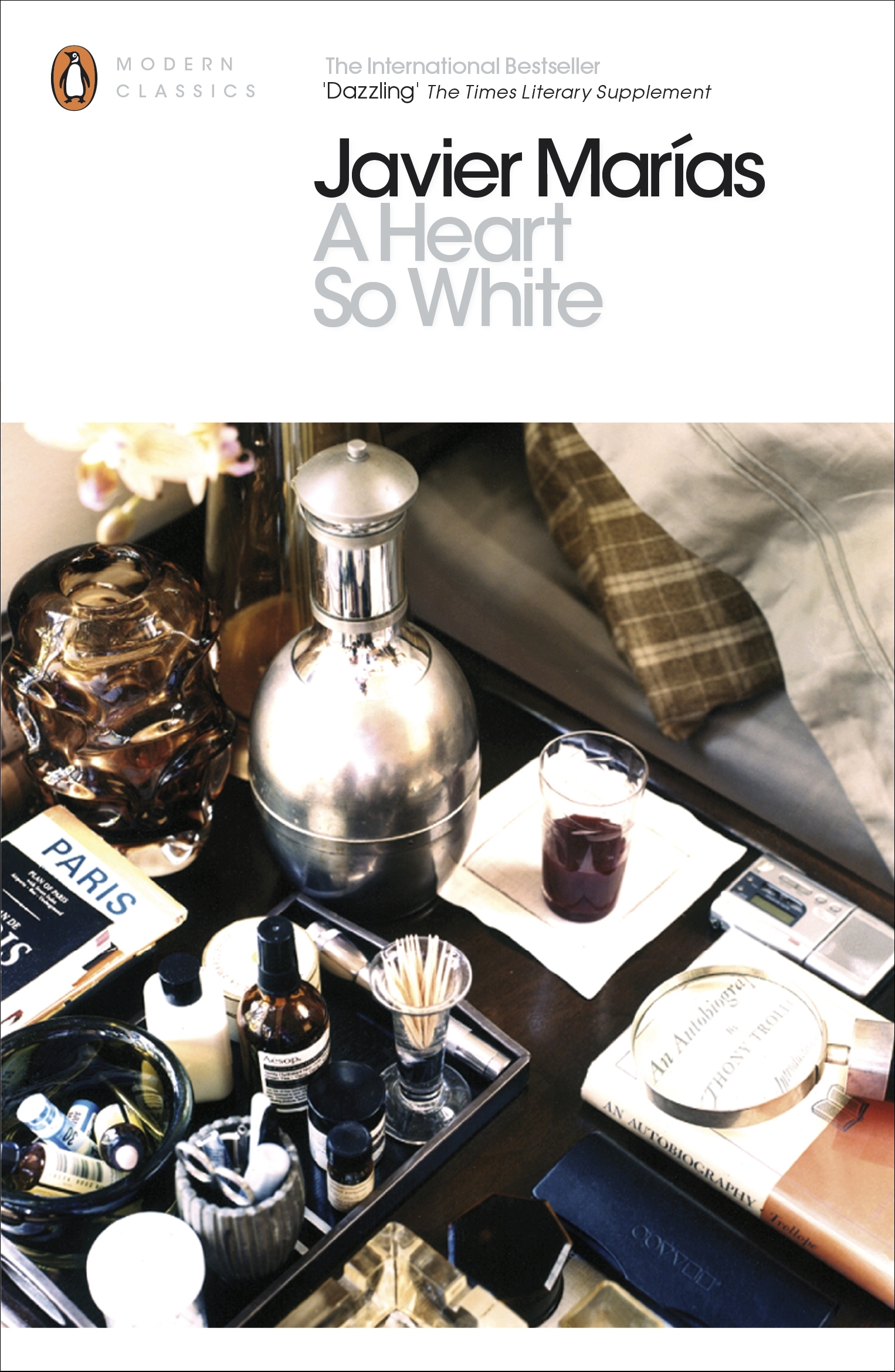
A HEART SO WHITE
by Javier Marías
A Heart So White, probably Javier Marías, best-known novel, chronicles with unnerving insistence family secrets -and the relentless power of the past. Juan knows little of the interior life of his father Ranz; each has always seemed comfortable with their friendly but distant orbit. Only when Juan marries (and his new wife begins to find much to talk about with Ranz) does his son consider the past anew, and yet he doesn´t really want to know. Secrecy, its possible convenience and even civility, hovers throughout the novel -it is a sort of anti-detective story of human nature The sins of the father; the fraudulent and the genuine; marriage and strange repetitions of violence: Marías elegantly send shafts of inquisitor light into shadows. At the center of A Heart So White are the costs of ambivalence. ("My hands are of your colour; but I shame/To wear a heart so white" Shakespeare´s Macbeth )
"There is nothing like this in contemporary literature. A book of genius" Das literarische Quartett
"As quirkly as it is brilliant... An entertaining and intelligent novel" Washington Post
"The writing shows enormous cunning and a fiendish degree of patience! Nouvel Observateur
"Immense talent... a landmark (by) a genuine artist" Le Monde
"The work of a supreme stylist... The two protagonists´ civilized but complex marriages recall the compelling intricacies of Henry James... It is brilliantly done." James Woodall, The Times (London)
Family secrets are the prime elements of A Heart So White, perhaps the greatest novel by "the most talented Spanish author alive" (Il Messagero)
| |

"A Heart So White" is a breathtaking novel about family secrets, winner of the 1997 Dublin IMPAC Prize for the best novel published worldwide in English, and arguably Javier Marias's masterpiece. Javier Marias's "A Heart So White" chronicles with unnerving insistence the relentless power of the past. Juan knows little of the interior life of his father Ranz; but when Juan marries, he begins to consider the past anew, and begins to ponder what he doesn't really want to know. Secrecyits possible convenience, its price, and even its civilityhovers throughout the novel. "A Heart So White" becomes a sort of anti-detective story of human nature. Intrigue; the sins of the father; the fraudulent and the genuine; marriage and strange repetitions of violence: Marias elegantly sends shafts of inquisitory light into shadows and on to the costs of ambivalence. ("My hands are of your colour; but I shame/To wear a heart so white"Shakespeare's "Macbeth.")

A HEART SO WHITE
Reviewed by Samantha Schnee
In A Heart So White Javier Marías examines the commonplace yet peculiar institution of marriage and all its attendant secrets and betrayals. Juan is a newlywed translator who shuttles between the UN in New York and the Hague for six to eight weeks at a time, while his young bride Luisa, also a translator, remains behind in Madrid to establish their home together. In Juan's absence she develops a close relationship with her enigmatic father-in-law, a charismatic art dealer named Ranz who, though in his seventies, has not lost the charm that enabled him to marry three times despite the fact that his first wife died mysteriously and the second committed suicide upon returning from their honeymoon.
Juan has never enjoyed a particularly close relationship with his father, and though he cannot put his finger on exactly why, he has great misgivings about the friendship developing between his father and his spouse. Juan's feelings of unease and his difficulty accustoming himself to the conventions of conjugal life are refracted through many lenses: a conversation between a Spaniard and his Cuban lover that Juan and Luisa overhear while they are on their honeymoon in Havana; a one-night-stand that Juan facilitates for his friend and former lover, Berta, while he is staying in her apartment on one of his stints at the UN in New York; and descriptions of Juan's own family history, specifically his father's marriages. Juan is dogged by feelings of dread which seem to become more acute rather than abate the longer he is married.
Marías, the son of a prominent Spanish philosopher, ponders not only the curiosities of matrimony, he waxes philosophical on all matter of topics, and his digressions may lose the less patient reader. These asides, however, are always pertinent, building toward and culminating in an examination of passion so intense that it can drive a man to kill. As Lady Macbeth says to her husband shortly after Duncan's murder, "My hands are of your colour; but I shame/To wear a heart so white."
Margaret Jull Costa is at the height of her powers here, rendering an excellent translation of what many of Marías's followers deem his best work--indeed, it received the 1997 Dublin IMPAC Prize for the best novel published worldwide that year in English. Marías, too is a translator, and not only of Conrad, Sterne, Hardy and others into Spanish; he is, to quote his own most recent novel to appear in English (Your Face Tomorrow: Volume I, Fever and Spear), "…a translator or interpreter of people: of their behavior and reactions…their inconstancies, their limits, their innocence, their lack of scruples and their resistance; their possible degrees of loyalty or baseness and their calculable prices and their poisons and their temptations." It is this unerring insight into the infinite variety of all things human and its faithful translation onto the page that makes A Heart so White, in fact all Marías's work, so great.
Read more: http://wordswithoutborders.org/book-review/a-heart-so-white-by-javier-maras#ixzz2GufvQN9r
http://wordswithoutborders.org/book-review/a-heart-so-white-by-javier-maras

A Heart So White by Javier Marías





%2B(1).jpg)

No comments:
Post a Comment